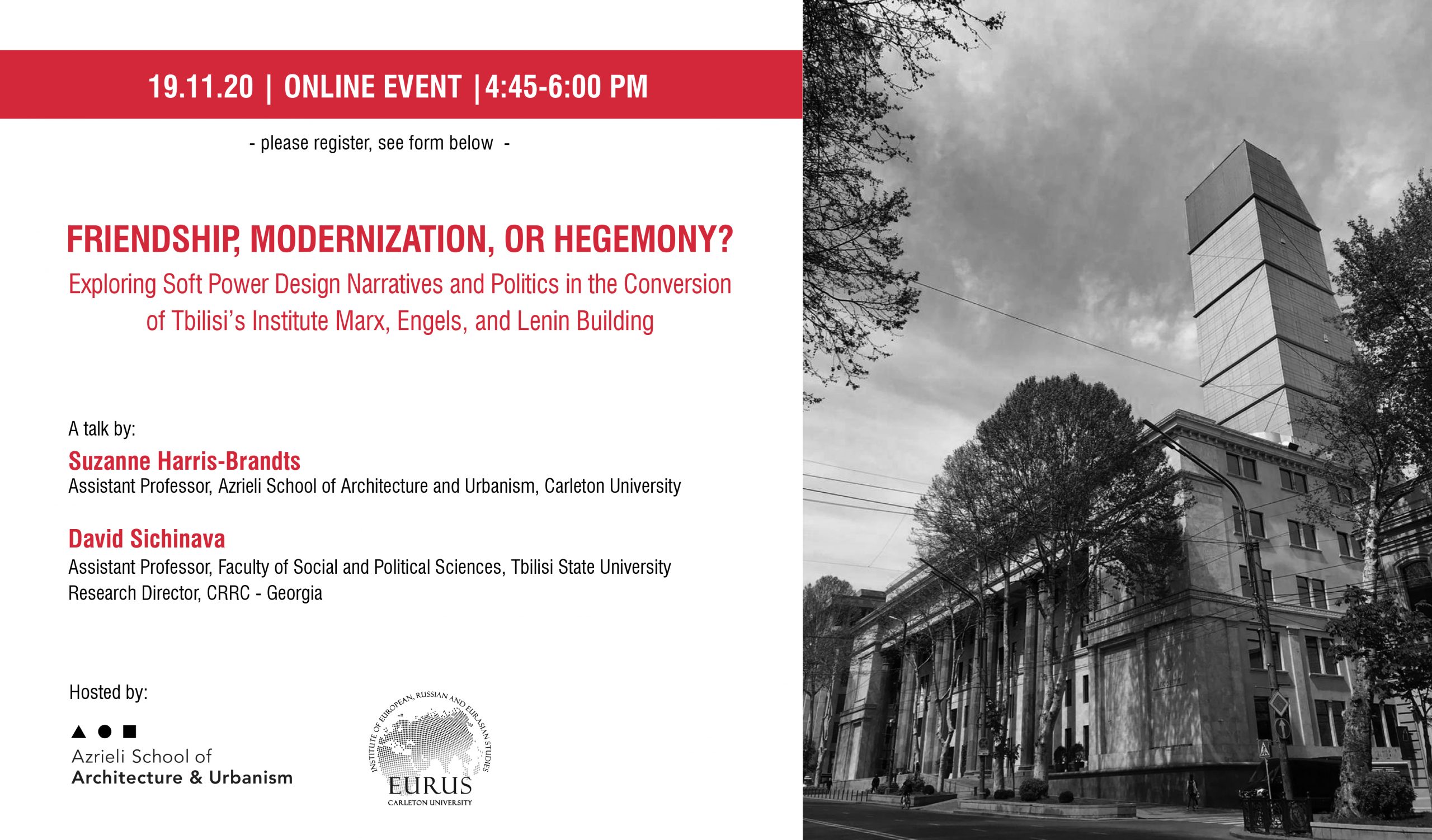Notice:
This event occurs in the past.
Friendship, Modernization, or Hegemony? Exploring Soft Power Design Narratives and Politics in the Conversion of Tbilisi’s Institute of Marx, Engels, and Lenin Building
Thursday, November 19, 2020 from 4:45 pm to 6:00 pm
- Tbd event

EURUS in conjunction with the Azrieli Schol of Architecture and Urbanism is hosting an online talk with Carleton’s Dr. Suzanne Harris-Brandts and Dr. David Sichinava (Tbilisi State University) on “Friendship, Modernization, or Hegemony? Exploring Soft Power Design Narratives and Politics in the Conversion of Tbilisi’s Institute of Marx, Engels, and Lenin Building,” November 19, 2020, from 4:45-6:00 pm on zoom. Registration is required, please see the form below. Zoom link to be sent out on the day of the event.
Abstract:
In 1938, the Soviet Georgian administration inaugurated the iconic Institute of Marx, Engels, and Lenin (IMEL) building in Tbilisi, Georgia under pretenses of socialist unity, modernization, and friendship among Soviet nations. Three-quarters of a century later, in 2016, the same building—now privatized, heavily renovated, and re-branded—was re-inaugurated as the seven-star Biltmore Hotel. In this talk, we track the shifting design symbolism associated with the building’s conversion and discuss the larger social, political, and economic implications of the city’s development. At a broader level, we chart modernization narratives in Georgia’s built environment and the manipulation of architecture to communicate power. The work draws from ongoing fieldwork funded by the Shota Rustaveli National Science Foundation of Georgia, including document analysis, personal interviews, and focus groups. It breaks down how the IMEL/Biltmore building served as an ideological medium and shows how, under the pretexts of benevolent friendship, Tbilisi has remained a city subject to foreign development whims.
Bios:
Dr. Suzanne Harris-Brandts is an Assistant Professor of Architecture and Urbanism at Carleton University. Her research brings together design and the social sciences to explore issues of power, equity, and collective identity in the built environment. Harris-Brandts’s current book project, entitled Constructing the Capital, draws from her dissertation uncovering the politics of urban development and image-making in Eurasian capital cities. It examines city building campaigns in “hybrid regimes” (part-democratic/ part-authoritarian regimes), foregrounding the cases of Tbilisi, Georgia and Skopje, North Macedonia. The work demonstrates how architecture and urban design are manipulated for power retention in hybrid regimes, while also highlighting bottom-up, community-based strategies to resist such actions. Harris-Brandts is also co-founder of Collective Domain, a practice for spatial analysis, urban activism, architecture, and media in the public interest.
Dr. David Sichinava is an Assistant Professor in the Faculty of Social and Political Sciences at Tbilisi State University. He is also a part-time professor at the International School of Economics at Tbilisi State University (ISET) and the International Black Sea University (Tbilisi, Georgia). Sichinava’s research focuses on the social, spatial, and temporal aspects of inequality, the politics of urban development, and the role of civil society in urban policy. Recent publications include book chapters for “Georgia: From Autocracy to Democracy” (edited by Jones & MacFarlane, University of Toronto Press, 2020) and ‘Urban Activism in Eastern Europe and Eurasia’ (edited by Dariyeva & Neugebauer, DOM Publishers, 2020). Sichinava is co-founder of Collective Domain and Research Director at the Caucasus Research Resource Centre (CRRC-Georgia) located in Tbilisi, Georgia.
ZOOM LINK:
Topic: Event: Friendship, Modernization and Hegemony
Time: Nov 19, 2020 04:45 PM America/Toronto
Join Zoom Meeting
https://carleton-ca.zoom.us/j/97523443521
*This talk will be recorded and posted to the EURUS YouTube page the following day.